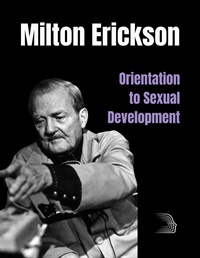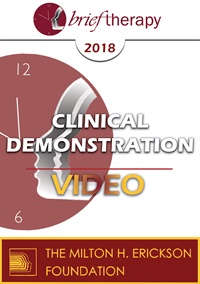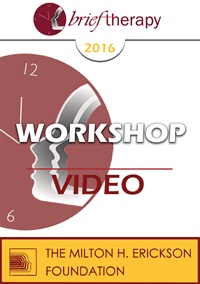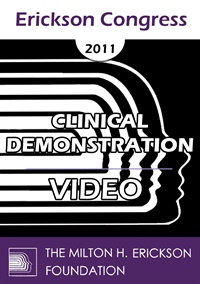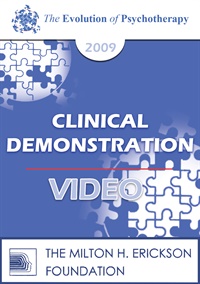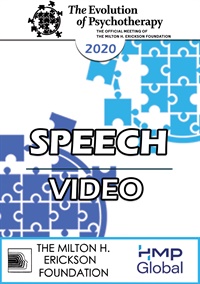
- Average Rating:
- Not yet rated
- Topic Areas:
- Hypnosis | Speeches | Research
- Categories:
- Evolution of Psychotherapy | Evolution of Psychotherapy 2020
- Faculty:
- Michael Yapko, PhD
- Course Levels:
- Master Degree or Higher in Health-Related Field
- Duration:
- 1 hour
- Format:
- Audio and Video
- Original Program Date:
- Dec 12, 2020
- Short Description:
- This presentation offers a lively, practical look at hypnosis as an essential yet misunderstood ally in psychotherapy. Exploring its scientific and experiential foundations, it shows how hypnotic processes enhance focus, flexibility, and learning across modalities—from CBT to mindfulness. Participants gain insight into how suggestion, attention, and dissociation shape change, and why embracing hypnosis as a deliberate, teachable skill can deepen therapeutic artistry and client empowerment.
- Price:
-
Sale is $29.00
price reduced from Base Price - $59.00
This program is not available for credit.
- Average Rating:
- Not yet rated
- Topic Areas:
- Sex and Sexuality | Ericksonian Hypnosis and Therapy Techniques | Milton Erickson | Couples Therapy | Children and Adolescent Therapy | Humor | Hypnosis
- Categories:
- Erickson Materials | Erickson Streaming Video Collection | Milton H. Erickson Collections
- Faculty:
- Jeffrey Zeig, PhD | Milton H. Erickson, MD
- Course Levels:
- Master Degree or Higher in Health-Related Field
- Duration:
- 1 hour
- Format:
- Audio and Video
- Original Program Date:
- Jul 07, 2020
- Short Description:
- In this video, Dr. Milton Erickson describes sexual development — from infancy to adulthood, with a focus on male sexual maturation. As Erickson’s describes sexual development, the viewer feels as if they are going through the process as well. Erickson also includes humorous anecdotes of his children as they grew into adults. At the end of the video Dr. Jeffrey Zeig comments on Erickson’s fascinating teaching methods and communication techniques.
- Price:
- $19.95 - Base Price
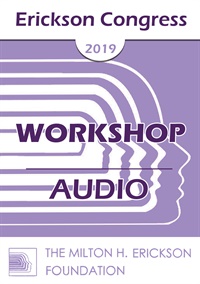
- Average Rating:
- Not yet rated
- Topic Areas:
- Workshops | Ericksonian Hypnosis and Therapy Techniques | Milton Erickson | Meditation, Spirituality and Yoga | Pain and Healing
- Categories:
- Erickson Congress | Erickson Congress 2019
- Faculty:
- Marilia Baker, MSW
- Duration:
- 1 Hour 27 Minutes
- Format:
- Audio Only
- Original Program Date:
- Dec 15, 2019
- Short Description:
- This workshop traces how a formative journey in Erickson’s early life shaped a wide range of therapeutic strategies still used today. Through clinical stories and live demonstrations, it explores guided imagery, pattern disruption, humor, and experiential techniques drawn from hypnosis, trauma work, and problem-solving therapy. The session gives therapists a hands-on sense of how flexible, creative interventions can unlock change across settings, from child therapy to pain management and coaching.
- Price:
- $15.00 - Base Price
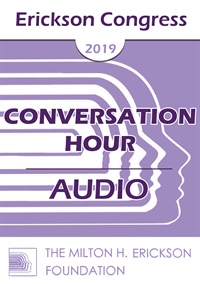
- Average Rating:
- Not yet rated
- Topic Areas:
- Conversation Hours | Art and Creativity | Communication | Humor
- Categories:
- Erickson Congress | Erickson Congress 2019
- Faculty:
- Michael Hoyt, PhD
- Duration:
- 1 Hour 3 Minutes
- Format:
- Audio Only
- Original Program Date:
- Dec 14, 2019
- Short Description:
- For many, Erickson set the prototypical example of how to be creative and often evoked a You Said What?! (YSW?!) reaction from clients and students. As we describe in the new book, Creative Therapy in Challenging Situations: Unusual Interventions to Help Clients (Hoyt & Bobele, 2019), such YSW?! interventions are particularly useful and effective when approaching unusual client problems.
- Price:
- $15.00 - Base Price
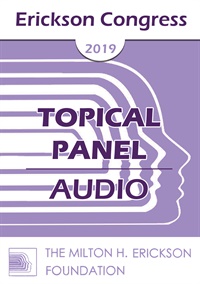
- Average Rating:
- Not yet rated
- Topic Areas:
- Topical Panels | Humor | Therapist Development
- Categories:
- Erickson Congress | Erickson Congress 2019
- Faculty:
- Rick Miller, MSW | Donald Miretsky, M.Ed | Bill O'Hanlon, MS
- Duration:
- 57 Minutes
- Format:
- Audio Only
- Original Program Date:
- Dec 13, 2019
- Short Description:
- Jokes can be used as a vehicle in which therapeutic messages can be couched. Humor can enliven the therapeutic situation.
- Price:
- $15.00 - Base Price
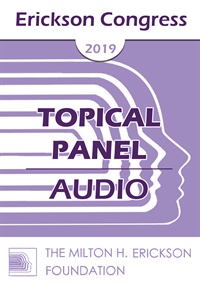
- Average Rating:
- Not yet rated
- Topic Areas:
- Workshops | Obsessive Compulsive Disorder (OCD) | Brief Therapy | Strategic Therapy
- Categories:
- Erickson Congress | Erickson Congress 2019
- Faculty:
- Reid Wilson, PhD
- Duration:
- 1 Hour 58 Minutes
- Format:
- Audio Only
- Original Program Date:
- Dec 12, 2019
- Short Description:
- Learn how to shift the OCD mindset quickly using bold, strategic techniques that move beyond standard Exposure and Response Prevention (ERP). This session covers paradoxical interventions, behavioral experiments, and building a non-scared, competitive attitude toward obsessions. Includes practical tools, case examples, and guidance on assertive, collaborative treatment.
- Price:
- $15.00 - Base Price
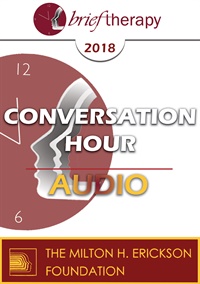
- Average Rating:
- Not yet rated
- Topic Areas:
- Great Conversations | Anxiety | Brief Therapy
- Categories:
- Brief Therapy Conference | Brief Therapy Conference 2018
- Faculty:
- Bill O'Hanlon, MS | Reid Wilson, PhD
- Duration:
- 1:01:40
- Format:
- Audio Only
- Original Program Date:
- Dec 08, 2018
- Short Description:
- Bill O’Hanlon and Reid Wilson share a fast-paced, results-driven approach to treating anxiety with brief therapy. Emphasizing immediate action, strong rapport, and personalized strategies, they challenge traditional models in favor of cognitive experiments and strategic disruptions. Techniques include articulatory suppression, external focus, and reframing anxiety to break unhelpful patterns. The session also explores big-picture thinking and the role of conflict resolution in lasting change.
- Price:
- $15.00 - Base Price
Credit available - Click Here for more information
- Average Rating:
- Not yet rated
- Topic Areas:
- Clinical Demonstrations | Obsessive Compulsive Disorder (OCD) | Brief Therapy
- Categories:
- Brief Therapy Conference | Brief Therapy Conference 2018 | Online Continuing Education
- Faculty:
- Reid Wilson, PhD
- Course Levels:
- Master Degree or Higher in Health-Related Field
- Duration:
- 1:00:23
- Format:
- Audio and Video
- Original Program Date:
- Dec 08, 2018
- Short Description:
- In this live demonstration, Reid Wilson works with a participant facing OCD rooted in relationships and morality. Emphasizing process over content, Wilson introduces a bold two-week experiment—donating to an opposing political party as a consequence for engaging obsessions. The session highlights detachment, strategic disruption, and mindfulness as tools for reducing the power of intrusive thoughts.
- Price:
-
Sale is $29.00
price reduced from Base Price - $59.00
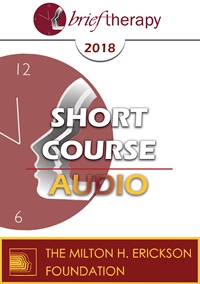
- Average Rating:
- Not yet rated
- Topic Areas:
- Short Courses | Humor | Psychotherapy | Brief Therapy | Relationships
- Categories:
- Brief Therapy Conference | Brief Therapy Conference 2018
- Faculty:
- Steven Sultanoff, Psychologist
- Duration:
- 1:18:02
- Format:
- Audio Only
- Original Program Date:
- Dec 06, 2018
- Short Description:
- Integrating therapeutic humor into psychotherapy is more than simply using humor with clients. This presentation will explore how and why integrating humor into clinical practice can be effective as well as assist clinicians to use humor with clinical awareness. Participants will learn a model of clinical humor that provides a foundation for the use of humor in psychotherapy and discover how humor (when purposely chosen as a clinical intervention) can be used as a relationship enhancing intervention, as well as a diagnostic and treatment tool.
- Price:
- $15.00 - Base Price
- Average Rating:
- Not yet rated
- Topic Areas:
- Anxiety | Depression | Hypnosis | Children and Adolescent Therapy | Workshops | Humor
- Categories:
- Brief Therapy Conference | Brief Therapy Conference 2016
- Faculty:
- Lynn Lyons, LICSW
- Course Levels:
- Master Degree or Higher in Health-Related Field
- Duration:
- 2:47:32
- Format:
- Audio and Video
- Original Program Date:
- Dec 11, 2016
- Short Description:
- Anxiety and depression go hand in hand; untreated anxiety during childhood is a top predictor of depression in adolescents and young adults. This workshop teaches how to interrupt the patterns of anxiety and depression in children, first by recognizing what patterns need to change and then using creative and hypnotic language, homework, humor to actively make shifts happen. Concrete strategies are based on three frames that help simplify and target the patterns so common in anxiety, depression, somatic, and sleep problems.
- Price:
-
Sale is $29.95
price reduced from Base Price - $59.00

- Average Rating:
- Not yet rated
- Topic Areas:
- Conversation Hours | Anxiety | Obsessive Compulsive Disorder (OCD) | Strategic Therapy
- Categories:
- Brief Therapy Conference | Brief Therapy Conference 2016
- Faculty:
- Reid Wilson, PhD
- Duration:
- 59:28
- Format:
- Audio Only
- Original Program Date:
- Dec 10, 2016
- Short Description:
- A practical, evidence-based approach to treating anxiety disorders. Reid Wilson outlines why acceptance, planning, and strategic therapy matter more than symptom suppression. He shares insights on medication use—favoring SSRIs over benzodiazepines—and emphasizes CBT as a core treatment. Includes specific strategies for managing social anxiety, normalizing judgment, and integrating both cognitive and somatic techniques for lasting change.
- Price:
- $15.00 - Base Price
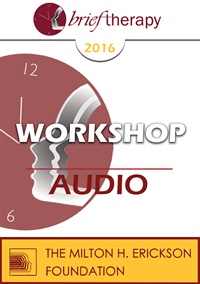
- Average Rating:
- Not yet rated
- Topic Areas:
- Workshops | Anxiety | Shame | Strategic Therapy
- Categories:
- Brief Therapy Conference | Brief Therapy Conference 2016
- Faculty:
- Reid Wilson, PhD
- Duration:
- 2:37:10
- Format:
- Audio Only
- Original Program Date:
- Dec 09, 2016
- Short Description:
- Reid Wilson explores how strategic self-talk can boost performance and reduce anxiety. This session covers techniques like reappraisal, motivational cues, and embracing uncertainty—especially for clients with OCD. Real-life examples and interactive exercises show how vocalizing self-talk and adopting a competitive mindset can build resilience and shift behavior quickly.
- Price:
- $15.00 - Base Price
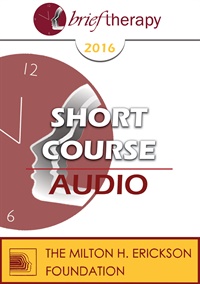
- Average Rating:
- Not yet rated
- Topic Areas:
- Short Courses | Brief Therapy | Communication | Relationships | Therapeutic Relationship | Humor
- Categories:
- Brief Therapy Conference | Brief Therapy Conference 2016
- Faculty:
- John Lentz, D. Min.
- Duration:
- 1:40:07
- Format:
- Audio Only
- Original Program Date:
- Dec 08, 2016
- Short Description:
- One liners that change people is the epitome of brief therapy. All of us have had times when one thing was said at the right moment by the right person and suddenly the world was seen differently. This workshop invites you to recognize elements that make those magic moments possible.
- Price:
- $15.00 - Base Price
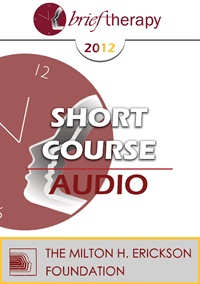
- Average Rating:
- Not yet rated
- Topic Areas:
- Couples Therapy | Short Courses
- Categories:
- Brief Therapy Conference | Brief Therapy Conference 2012
- Faculty:
- Birgitta Gregory, PhD | Bruce Gregory, PhD
- Duration:
- 1:28:56
- Format:
- Audio Only
- Original Program Date:
- Dec 09, 2012
- Short Description:
- BT12 Short Course 35 – An Integrative and Creative Approach Working with Couples Achieving Lasting Solutions – Bruce Gregory, PhD and Birgitta Gregory, PhD This short course will focus on the treatment of couples from the perspectives of symptoms, rigid, dysfunctional behavior patterns, and narcissistic defenses. An integrative approach utilizing creativity and humor will be presented, incorporating CBT, psychodynamic, Ericksonian, Jungian and existential perspectives. Validation, sequencing, containment and questions that facilitate accountability will be highlighted in the context of empowering clients on a variety of levels.
- Price:
- $15.00 - Base Price
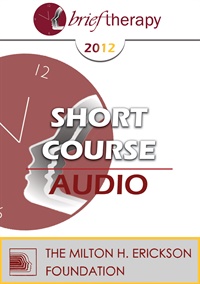
- Average Rating:
- Not yet rated
- Topic Areas:
- Psychotherapy | Short Courses | Humor
- Categories:
- Brief Therapy Conference | Brief Therapy Conference 2012
- Faculty:
- Steve Sultanoff
- Duration:
- 1:26:57
- Format:
- Audio Only
- Original Program Date:
- Dec 05, 2012
- Short Description:
- BT12 Short Course 28 – Humor Matters: Clinical Application of Humor in Psychotherapy – Steve Sultanoff, PhD Humor in the serious realm of psychotherapy? In this lively presentation, filled with anecdotes and clinical illustrations, we will explore the rationale for and practical application of the conscious and purposeful use of humor in psychotherapy. Humor can create change in the central aspects of human experience—cognitions, emotions, behaviors, and physiology. We will explore how humor can be a powerful tool to build the relationship, diagnose, and treat, and we will differentiate between empathic and hostile styles of humor.
- Price:
- $15.00 - Base Price
Tags: Humor Psychotherapy
- Average Rating:
- Not yet rated
- Topic Areas:
- Clinical Demonstrations | Obsessive Compulsive Disorder (OCD) | Strategic Therapy
- Categories:
- Erickson Congress | Erickson Congress 2011
- Faculty:
- Reid Wilson, PhD
- Course Levels:
- Master Degree or Higher in Health-Related Field
- Duration:
- 1:00:53
- Format:
- Audio and Video
- Original Program Date:
- Dec 10, 2011
- Short Description:
- A powerful live session exploring the emotional impact of trauma tied to medical procedures. A participant shares a painful dental experience that reignited fears of disfigurement and past wounds. Through guided dialogue, the session highlights how acknowledging emotions, confronting fear, and rebuilding self-image can empower clients to take an active role in healing and personal change.
- Price:
-
Sale is $29.00
price reduced from Base Price - $59.00
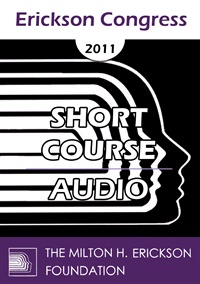
- Average Rating:
- Not yet rated
- Topic Areas:
- Short Courses | Eating Disorders | Ericksonian Hypnosis and Therapy Techniques | Interviewing | Metaphors | Utilization | Weight Loss | Humor
- Categories:
- Erickson Congress | Erickson Congress 2011
- Faculty:
- Stu Belskus, MSW
- Duration:
- 51:09
- Format:
- Audio Only
- Original Program Date:
- Dec 09, 2011
- Short Description:
- This workshop explores Ericksonian approaches to weight loss, including paradox, metaphor, utilization, humor and possibilities. Motivational Interviewing will be utilized. The metaphor of weight loss as a journey is central. Departure, initiation and return are highlighted, noting obstacles and struggles encountered during this exciting adventure! A transformational journey representing a higher level of conscious-ness with increased meaning that makes change possible will be presented.
- Price:
- $15.00 - Base Price
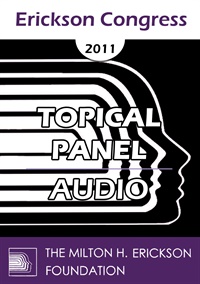
- Average Rating:
- Not yet rated
- Topic Areas:
- Topical Panels | Humor
- Categories:
- Erickson Congress | Erickson Congress 2011
- Faculty:
- Danie Beaulieu, PhD | Camillo Loriedo, MD, PhD | Robert Schwarz, PsyD | Bernhard Trenkle, Dipl. Psych
- Duration:
- 59 Minutes
- Format:
- Audio Only
- Original Program Date:
- Dec 07, 2011
- Short Description:
- Topical Panel on use of Humor, featuring Danie Beaulieu, Camillo Loriedo, Robert Schwarz and Bernhard Trenkle.
- Price:
- $20.00 - Base Price
Tags: Humor
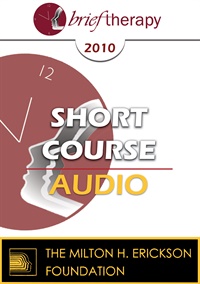
- Average Rating:
- Not yet rated
- Topic Areas:
- Short Courses | Humor | Brief Therapy
- Categories:
- Brief Therapy Conference | Brief Therapy Conference 2010
- Faculty:
- Howard Richmond
- Duration:
- 1:17:34
- Format:
- Audio Only
- Original Program Date:
- Dec 09, 2010
- Short Description:
- The use of humor can have a variety of positive effects in treatment. It can increase therapeutic rapport, energize and revitalize both client and therapist, and foster an environment more conductive to deeper healing. Through story telling, clinical vignettes and audience participation, attendees will discover new and valuable ways to use humor appropriately in clinical practice. With Howard Richmond.
- Price:
- $15.00 - Base Price
Tags: Humor Brief Therapy
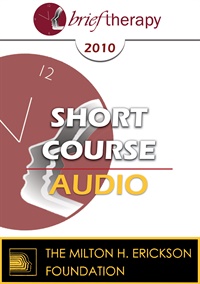
- Average Rating:
- Not yet rated
- Topic Areas:
- Cognitive Behavior Therapy (CBT) | Psychotherapy | Short Courses | Humor | Brief Therapy
- Categories:
- Brief Therapy Conference | Brief Therapy Conference 2010
- Faculty:
- Steve Sultanoff | Steven Sultanoff, Psychologist
- Duration:
- 1:26:25
- Format:
- Audio Only
- Original Program Date:
- Dec 09, 2010
- Short Description:
- Humor in the serious realm of psychotherapy? This lively presentation, filled with anecdotes and clinical illustrations, will explore the rationale for and practical application of humor in cognitive therapy. Both cognitive therapy and humor can create change in the central aspects of human experience—cognitions, emotions, behaviors, and physiology. The presenter will explore how humor can be a powerful tool for both diagnosis and treatment, and will differentiate between empathic and hostile styles of humor. With Steven Sultanoff.
- Price:
- $15.00 - Base Price

- Average Rating:
- Not yet rated
- Topic Areas:
- Trance | Short Courses | Art and Creativity | Brief Therapy | Neuroscience
- Categories:
- Brief Therapy Conference | Brief Therapy Conference 2010
- Faculty:
- Betty Blue, PhD
- Duration:
- 1:08:53
- Format:
- Audio Only
- Original Program Date:
- Dec 09, 2010
- Short Description:
- Play is more than lightness, it is a neurobiological intervention. In this lively and research-informed session, Betty Blue connects interactive playfulness with trance, mirror neurons, oxytocin, stress reduction, immune function, and neuroplasticity. Blending humor, experiential exercises, primate research, and clinical stories, she demonstrates how deliberate play can loosen rigid patterns, deepen empathy, and help clients transcend suffering while strengthening connection and resilience.
- Price:
- $15.00 - Base Price
- Average Rating:
- Not yet rated
- Topic Areas:
- Clinical Demonstrations | Strategic Therapy | Couples Therapy | Psychotherapy
- Categories:
- Evolution of Psychotherapy | Evolution of Psychotherapy 2009 | Pioneers in Couples and Family Therapy
- Faculty:
- Cloe Madanes, HDL, LIC
- Course Levels:
- Master Degree or Higher in Health-Related Field
- Duration:
- 55:41
- Format:
- Audio and Video
- Original Program Date:
- Dec 11, 2009
- Short Description:
- This clinical demonstration features a couple navigating conflict around holiday celebrations rooted in past trauma and unmet emotional needs. Through guided dialogue, core needs like significance, honesty, growth, and connection are identified. Strategies include emotional expression, increased affection, and a closing exercise designed to strengthen intimacy and deepen their bond.
- Price:
-
Sale is $29.00
price reduced from Base Price - $59.00
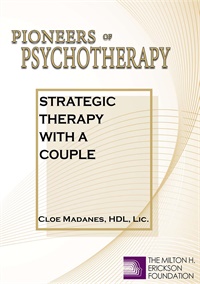
- Average Rating:
- Not yet rated
- Topic Areas:
- Clinical Demonstrations | Couples Therapy | Strategic Therapy
- Bundle(s):
- Women Pioneers of Psychotherapy | Pioneers of Psychotherapy Bundle
- Categories:
- Pioneers of Psychotherapy | Evolution of Psychotherapy | Evolution of Psychotherapy 2009 | Pioneers in Couples and Family Therapy
- Faculty:
- Cloe Madanes, HDL, LIC
- Course Levels:
- Master Degree or Higher in Health-Related Field
- Duration:
- 00:57:00
- Format:
- Audio and Video
- Original Program Date:
- Dec 10, 2009
- Short Description:
- This clinical demonstration features a couple navigating conflict around holiday celebrations rooted in past trauma and unmet emotional needs. Through guided dialogue, core needs like significance, honesty, growth, and connection are identified. Strategies include emotional expression, increased affection, and a closing exercise designed to strengthen intimacy and deepen their bond.
- Price:
- $59.00 - Base Price
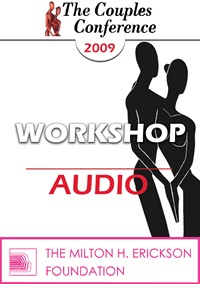
- Average Rating:
- Not yet rated
- Topic Areas:
- Workshops | Couples Therapy | Strategic Therapy
- Categories:
- Couples Conference | Couples Conference 2009 | Pioneers in Couples and Family Therapy
- Faculty:
- Cloe Madanes, HDL, LIC
- Duration:
- 1:35:24
- Format:
- Audio Only
- Original Program Date:
- May 02, 2009
- Short Description:
- Creative, structured strategies for strengthening couples’ relationships. Topics include resolving parent-child enmeshment, addressing marital loyalty conflicts, preventing domestic violence through financial contracts and family involvement, and using rituals to reset dynamics. Techniques like humor, scheduled communication, and presence-building exercises help rekindle intimacy, reduce conflict, and support long-term connection.
- Price:
- $15.00 - Base Price
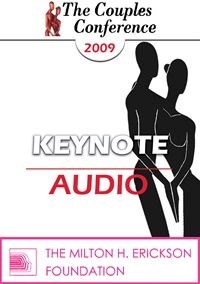
- Average Rating:
- Not yet rated
- Topic Areas:
- Keynotes | Couples Therapy
- Categories:
- Couples Conference | Couples Conference 2009 | Pioneers in Couples and Family Therapy
- Faculty:
- Cloe Madanes, HDL, LIC
- Duration:
- 54:58
- Format:
- Audio Only
- Original Program Date:
- May 02, 2009
- Short Description:
- Madanes tells her favorite stories of therapy with difficult couples. She discusses some innovative strategies for couples therapy, including the use of financial incentives, behavioral contracts, and cultural storytelling to shift dynamics and resolve conflicts. The case examples cover topics like punctuality, anxiety, fetish behaviors, and parental disputes in divorce. Madanes emphasizes the value of creating positive memories, setting clear boundaries, and prioritizing children's well-being in high-conflict families.
- Price:
- $15.00 - Base Price


